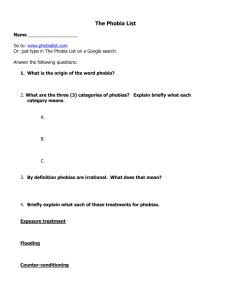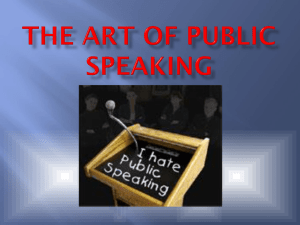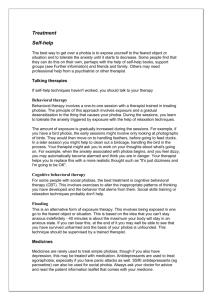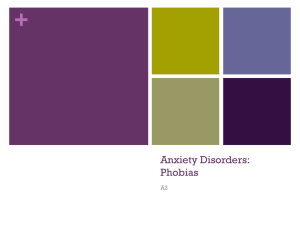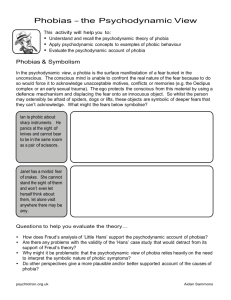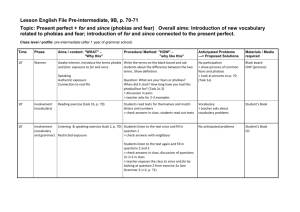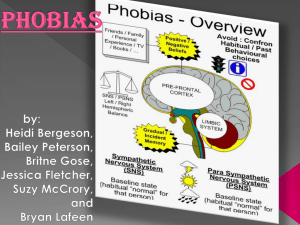specific phobia
advertisement
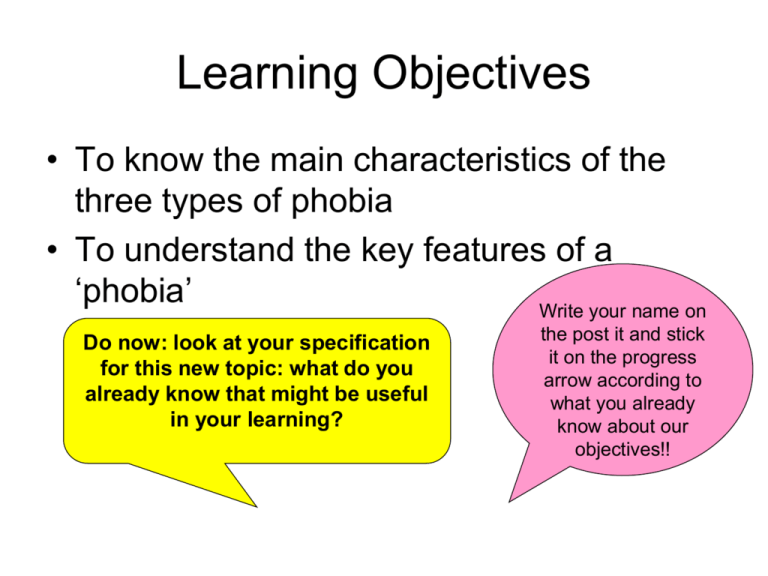
Learning Objectives • To know the main characteristics of the three types of phobia • To understand the key features of a ‘phobia’ Write your name on Do now: look at your specification for this new topic: what do you already know that might be useful in your learning? the post it and stick it on the progress arrow according to what you already know about our objectives!! Don’t have your spec? – WHY NOT?! • Individual Differences (anxiety disorders) • 3.2.5 Anxiety Disorders Phobias: definition and symptoms. Agoraphobia, social phobias and specific phobias. • Obsessive-compulsive disorder: definition and symptoms. The distinction between obsession and compulsion. • Explanations of phobias including behavioural and psychodynamic. • Explanations of OCD including biological and cognitive. • Treatments for phobias including systematic desensitisation and psychodynamic therapy. • Treatments for OCD including drug therapy and cognitive therapy. • Evaluation of treatments for anxiety disorders. Starter – how might this image relate to our new topic of phobias? What do you recall about the specifics of the fight or flight response? Atypical Introduction Situational • In your groups of three you have an example of a specific phobia • Your job is going to be to act it out so that the rest of the class can guess what the phobia consists of! • Each phobia is representative of a category of specific phobias in something called the DSMIVR (the Diagnostic and Statistical Manual which is used to identify and classify mental disorders) Animal Natural Environment Blood / injection / injury Natural Environment • hydrophobia – a fear of water • acrophobia – a fear of heights Natural Environment • claustrophobia – a fear of enclosed spaces Situational • arachnophobia – a fear of spiders (and Animal other arachnids, e.g. scorpions) • haemophobia – a fear of blood Blood / injection / injury Atypical • emetophobia – a fear of being sick • cynophobia – a fear of dogs Animal Learning Objectives • To know the main characteristics of the three types of phobia • To understand the key features of a ‘phobia’ PROGRESS CHECK! What have you learnt? Can you progress towards our objectives? Main task: Marketplace • Use the information sheets to explain the scenarios you have been given • Each group also has a general question which has been asked about phobias they must answer in terms of phobias • One person will remain in the group – they are the ‘seller’ of the information • The rest of the group will go and ‘buy’ information from the other ‘stalls’ • Then they will come back and share with the seller what they have learnt! • Remember the focus is on you explaining the information Learning Objectives • To know the main characteristics of the three types of phobia • To understand the key features of a ‘phobia’ PROGRESS CHECK! What have you learnt? Can you progress towards our objectives? Plenary • What were our learning objectives? • How have we met them? • What is the key aspect you will remember from today’s lesson? Progress Check: 12B See if you can answer the following questions based on the learning from yesterday’s lesson 1. What are the 3 types of phobia 2. Why is someone who has a ‘slight fear’ of rabbits not classed as suffering from a phobia? If you can answer these two questions you are at the top part of the arrow! 3. What are the characteristics of the 3 types of phobia? If you can answer question 1,2 and 3 you are as good as it gets at the very top of the arrow!!
